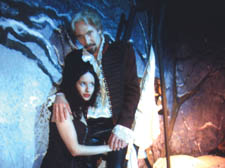|
|
 |
| |
Theatre Review | The Tempest | Pentameters |
THE TEMPEST
Pentameters
AFTER suffering for five nights from a mysterious bout of insomnia, I was rather hoping The Tempest might hold some solution to my woes.
The play is Shakespeare’s last solo work and his farewell to the stage; the playwright pitting himself as the exiled Dark Arts master Prospero who describes the inhabitants of his magical isle as “such stuff as dreams are made on”.
It was WH Auden who first spotted the significance of these lines, in his poem the Sea and the Mirror (1944), as revealing Shakespeare’s frustration with the airy-fairy idealism of art and its impotency to impact on the real world.
The concept runs throughout the play. The native slave Caliban admits how the enchantments of the isle can often send him lurching into Utopian dreams, “that, when I waked, I cried to dream again”.
I saw Patrick Stewart play Prospero in a glitzy Royal Shakespeare Company performance at the Novello last year, but Harry Meacher, who has also adapted and directed this production, was far better. While Stewart is very good at playing leaders – see Star Trek and X-Men – he couldn’t quite pull off the paternal relationship with Miranda.
I actually felt like Meacher was giving away his own daughter when he loses Miranda, played here by Holly Hinton, to Ferdinand (Tom Hunter). He brought a certain dread to the role. His manic wrath, reserved for the enslaved Caliban (Seamus Newham), was truly fearsome and he has the knack of delivering the tricky language so that its meaning is properly understood.
This faultless production locates the island in an early 20th century wilderness – “a black rock where the wind blows and snow covers the trees” – according to the programme notes.
The theme is Victorian Gothic. Miranda, the personification of innocence, wears black and Caliban appeared as a kind of hunched mixture of Frankenstein’s monster and Dracula.
Newman’s performance as the wronged native of the isle started shakily – his early castigation of Prospero was spluttered rather than roared – but the interpretation grew on me as the play progressed.
A special mention must go to the excellent Jonson Wilkinson and Georgina Cardy as the Stephano/Trinculo double act. Those slapstick exchanges are not so easy to engage the audience.
Tom Hunter, astonishingly, managed to bring some character to the love-sick bore Prince Ferdinand. No mean feat, I can assure you.
I hear that Meacher is making this outing his last, bringing the curtain down on a career that has spanned the National Theatre, The Royal Court and most of the major English repertory companies.
That would be a great shame judging by this performance, but you can see the attraction for any thesp in making Prospero’s part your swansong.
Prospero’s epilogue, where he pleads with the audience to finally release him from the stage with approval, was felt.
As I got up from the plump cushions of Pentameters, I felt eye-lids droop and later enjoyed the sleep of the century.
Until June 28
020 7435 3648 |

|
 |
|
|
 |
|



